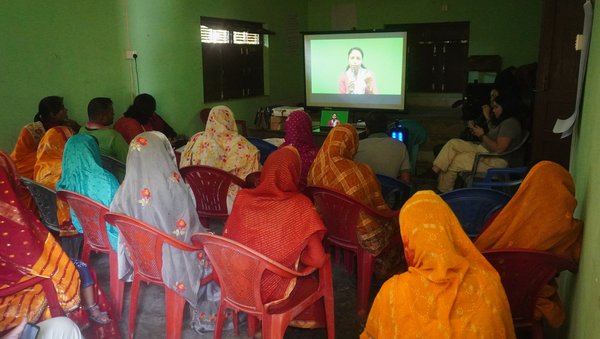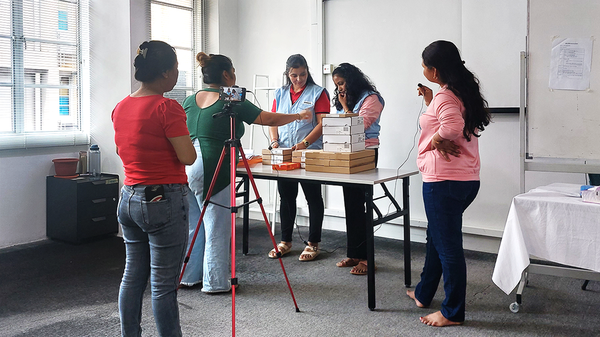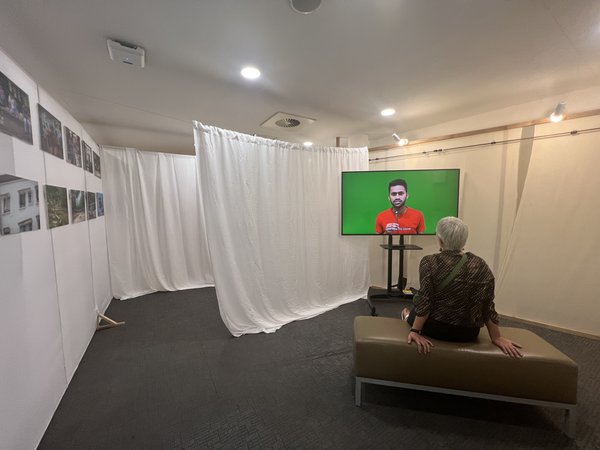
MIDEQ member Sheril A. Bustaman with participants at the Mapping Journeys exhibition. Photo via MIDEQ Malaysia.
A culmination of the MIDEQ Malaysia creative outputs, Mapping Journeys was a multi-pronged exhibition that was held from the 16th October to the 10th November 2023.
In Malaysia, migrant workers are seen as transient in existence and in their contributions. Thus, the understanding of their everyday as well as broader experiences are treated as such. Often given work that is dirty, dangerous and difficult, migrants are also overwhelmingly invisible. When thrust into the spotlight, they are portrayed as intimidating and deprived. The last four years of the Migration for Equality & Development (MIDEQ) Malaysia’s work has tried to close these immense gaps in understanding the structures and processes that compound their experiences and re-centre the humanity embedded in migrant journeys to and in Malaysia.
As part of this project, it is imperative that the data gathered and analyses generated contribute to influencing narratives, which have long been xenophobic and exploitative of liminal migrant communities. As such, with the breadth of data we have collected, the team intends to contribute to expanding and influencing narratives on migration and migrants in Malaysia.
Mapping Journeys is one such effort, a compilation of the MIDEQ Malaysia outputs, which include observational fieldwork video footage and photographs, video interviews, migrant-produced short films as well as an interactive-facilitated simulation that provides a glimpse of what it is like to be a migrant. Audiences could delve deeper into the everydayness of migrant realities, to view migrants through a renewed lens of empathy, solidarity and community. The physical exhibit took place from 16th October 2023 to 10th November 2023 on the Monash University Malaysia campus.
Sharing the Nepali migrant journey
With so many outputs produced, Mapping Journeys was conceptualised to be a journey of a Nepali migrant worker broken into three main nodes: Before Migration, Becoming a Migrant and Being a Migrant. Before Migration looks at the decision-making process of a Nepali migrant worker and the motivations behind migration such as providing better quality of life for their families, escaping domestic violence and in the cases of male migrants, searching for adventure. Becoming a Migrant delves into the process of migration and the intermediaries involved, be it formal or informal. Finally, Being a Migrant explores the Nepali migrant experience in Malaysia. The various outputs produced by the MIDEQ Malaysia team were then slotted into these three different nodes, creating a comprehensive journey for the average visitor of the exhibition.
In addition to the static exhibition, Mapping Journeys hosted three panel sessions with various stakeholders to discuss topics related to migration. The first panel on Envisioning Labour Protection in Malaysia featured prominent academicians, former policymakers and activists such as Prof Dr Ong Kian Ming, Dr Tharani Loganathan and Adrian Pereira of North-South Initiative and was moderated by Dr Nadiah Ahmad. Panellists discussed the extent of local and national legislative protections around migrant labour rights. Issues of discussion ranged from public health access to structural inequalities. The panel pointed to a lack of political will to create systems, which could increase migrant worker protections.
The second panel on Injecting Creativity into Activism started the conversation on how to use the arts as a tool for migrant activism, and featured creatives like Farzana Yakta of Parastoo Theatre, Foo Wei Meng of Gaia Creatives and New Su Shern of Ratio:Cause, moderated by Sheril A. Bustaman. The final panel was a migrant engagement day, where migrants of different communities were invited to Monash University Malaysia to listen to the participants that were involved in creating some of the outputs featured in the exhibitions. Interpreters were also provided and members of the Bangladeshi, Indonesian and Filipino community came together with several Nepali community members to participate in the session, moderated by Okui Lala of Gaia Creatives.
An immersive experience
As part of Mapping Journeys, the team hosted several university partners from around Selangor, Malaysia to tour the exhibition. Partners also participated in the immersive experience, headed by MIDEQ Malaysia secretariat members Tasia Khoo and Hong Di-Anne. The immersive experience simulation takes the student or player through a journey of migration through the eyes of a Nepali migrant worker character, that the student or player can choose at the beginning of the simulation. Throughout the simulation, the student or player make choices that will alter their debt count, and determine the ease of their migration journey.
After the immersive experience simulation, the participants reflected on the simulation, the characters they chose and how the choices they made in the simulation led to certain outcomes. This bridged the conversation to the realities of Nepali migrant workers, and the kinds of decisions they need to make and situations they find themselves in once they have migrated.
To make the exhibition accessible to all, the team created a virtual exhibition, with all of the outputs hosted online. A QR code of the virtual exhibition was also printed on various mediums (including the team’s t-shirts) for wider distribution.
Many of the visitors of Mapping Journeys, mainly consisting of the Monash University Malaysia staff and student body, remarked that they were moved by the outputs that were presented. Visitors also left their comments on the exhibition and messages for the migrants on the exhibition’s feedback wall. As co-organisers, we were humbled by the emotional responses to the exhibition. Many expressed admiration for the strength of the migrant workers and hopes for better policies and practices so that there can be smoother migration journeys in the future. It is our opinion that this emotional impact could only have been achieved through the use of video to amplify the voices of the migrant as they maintain the authenticity of the stories and resonate well with visitors.



